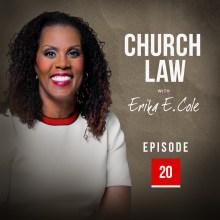Available on:
Church mergers appeared to reach an all-time high in 2019, but as more congregations struggle to find their way in the latter stages of the COVID-19 pandemic, the trend likely will only grow. Some churches have experienced financial declines. Others face uncertain futures as pastors resign or retire. And still others find themselves with expensive properties to maintain even as attendance dwindles.
In this episode, Erika examines three principal ways a merger can be done. Using examples from her work as an attorney advising congregations going through mergers, she highlights key considerations and challenges for leaders to note. And as a bonus, Erika touches on several best practices that churches should follow, whether leaders think a merger is in their future—or not.
Dig Deeper
- Church Mergers: When, Why, and How, from Church Law & Tax
- The Church Attorney’s Guide to Church Mergers, by Erika E. Cole
- On-Demand Webinar: Should My Church Consider a Merger Right Now? with Erika E. Cole
- Merger and Consolidation, by Richard R. Hammar
Questions? We welcome them! Please email Erika Cole at contact@takethenextcall.com. Erika reads each comment and may answer your question in an upcoming episode.
See all episodes of Church Law.
The Church Law podcast is part of Christianity Today’s ChurchLawAndTax.com, a not-for-profit publishing ministry.
This content is designed to provide accurate and authoritative information in regard to the subject matter covered. It is sold with the understanding that the publisher is not engaged in rendering legal, accounting, or other professional service. If legal advice or other expert assistance is required, the services of a competent professional person should be sought. "From a Declaration of Principles jointly adopted by a Committee of the American Bar Association and a Committee of Publishers and Associations." Due to the nature of the U.S. legal system, laws and regulations constantly change. The editors encourage readers to carefully search the site for all content related to the topic of interest and consult qualified local counsel to verify the status of specific statutes, laws, regulations, and precedential court holdings.
